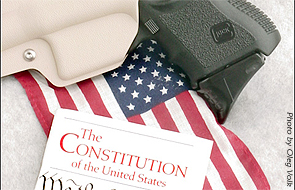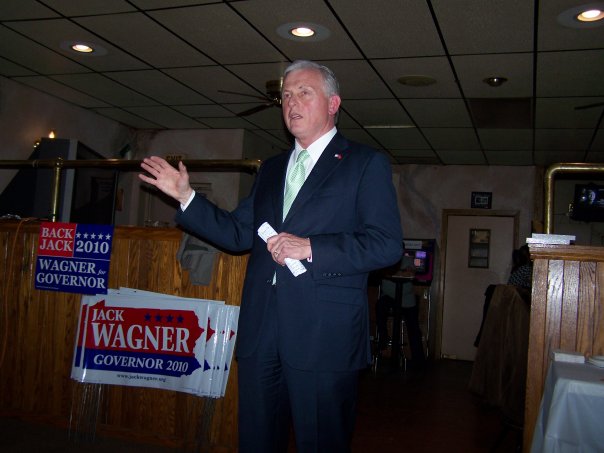Dan Onorato’s Unconstitutional Mischief
 Gun owners in Pennsylvania might wonder if gubernatorial candidate Dan Onorato is wearing a leprechaun’s outfit today in celebration of the mischief he proposed late yesterday with his “plan for safe communities.” His proposals include many gun control policies we knew he supported, but yesterday’s release marks a direct challenge to the Supreme Court’s Heller ruling in 2008, and the likely incorporation to the states that will come down in the McDonald case shortly.
Gun owners in Pennsylvania might wonder if gubernatorial candidate Dan Onorato is wearing a leprechaun’s outfit today in celebration of the mischief he proposed late yesterday with his “plan for safe communities.” His proposals include many gun control policies we knew he supported, but yesterday’s release marks a direct challenge to the Supreme Court’s Heller ruling in 2008, and the likely incorporation to the states that will come down in the McDonald case shortly.
Onorato’s campaign says, “Onorato supports legislation requiring that homes with minors use effective child safety locks or other devices that keep children from being accidentally killed by firearms.”
No gun owner wants to see a child killed by any means. For some families, locks are the best solution. However, mandating locked guns in a private home blatantly flies in the face of a conclusion reached in DC vs. Heller two year ago. Washington, DC required the few residents allowed to even own firearms to keep them locked away. The justices were very clear in their concerns about infringement upon the right to self-defense with mandatory locks:
JUSTICE SCALIA: I don’t understand that. What would that be — that you can, if you have time, when you hear somebody crawling in your — your bedroom window, you can run to your gun, unlock it, load it and then fire? Is that going to be the exception?
GENERAL CLEMENT: If that’s going to be the exception, it would clearly be inadequate.
…
CHIEF JUSTICE ROBERTS: Well, before you start with it, how many minutes does it take to remove a trigger lock and load a gun? Because both the gun has to be unloaded; it has to have a trigger lock under the District law.
MR. DELLINGER: Those are alternatives, Mr. Chief Justice.
CHIEF JUSTICE ROBERTS: No, disassembly and trigger lock.
MR. DELLINGER: I mean, this is simply an unlock.
CHIEF JUSTICE ROBERTS: In either case it has to be unloaded, correct?
MR. DELLINGER: There are some versions of the trigger lock that allow you to put the trigger lock on and then load the gun. But the piece that goes in the trigger mechanism, even someone as clumsy as I could remove it in a second.
CHIEF JUSTICE ROBERTS: Well, the law, as I understand it, says that the gun has to be unloaded. So under your hypothetical, I assume that would violate the District’s law if the gun is still loaded.
MR. DELLINGER: You — it’s a question of where you put the parenthesis. I read that as disassembled and unloaded or under a trigger lock, and that’s the — that’s the way the District reads it.
CHIEF JUSTICE ROBERTS: So how long does it take? If your interpretation is correct, how long does it take to remove the trigger lock and make the gun operable?
MR. DELLINGER: You — you place a trigger lock on and it has — the version I have, a few — you can buy them at 17th Street Hardware — has a code, like a three-digit code. You turn to the code and you pull it apart. That’s all it takes. Even — it took me three seconds.
JUSTICE SCALIA: You turn on — you turn on the lamp next to your bed so you can — you can turn the knob at 3-22-95, and so somebody —
MR. DELLINGER: Well —
CHIEF JUSTICE ROBERTS: Is it like that? Is it a numerical code?
MR. DELLINGER: Yes, you can have one with a numerical code.
CHIEF JUSTICE ROBERTS: So then you turn on the lamp, you pick up your reading glasses —
(Laughter.)
MR. DELLINGER: Let me tell you. That’s right. Let me tell you why at the end of the day this doesn’t — this doesn’t matter, for two reasons. The lesson —
CHIEF JUSTICE ROBERTS: It may not matter, but I’d like some idea about how long it takes.
The case goes on focusing on DC’s specific laws. However, the justices were quite clear that they were concerned about access and self-defense under a mandatory lock law. Their decision addresses the trigger lock law:
As we have said, the law totally bans handgun possession in the home. It also requires that any lawful firearm in the home be disassembled or bound by a trigger lock at all times, rendering it inoperable.
…
We must also address the District’s requirement (as applied to respondent’s handgun) that firearms in the home be rendered and kept inoperable at all times. This makes it impossible for citizens to use them for the core lawful purpose of self-defense and is hence unconstitutional.
…
In sum, we hold that the District’s ban on handgun possession in the home violates the Second Amendment, as does its prohibition against rendering any lawful firearm in the home operable for the purpose of immediate self-defense.
As many already realize, the District is a federal enclave, therefore Heller was limited in its scope. However, the question before the Court in McDonald is whether the Second Amendment rights initially questioned in Heller are applied to states and municipalities. With a favorable decision likely before the end of its term in June, Onorato is proposing a law that will violate the Court’s 2008 ruling on the scope of the Second Amendment and our right to self-defense in our homes.
The unconstitutional lock mandate isn’t the only gun control gun owners need to fear from Onorato. He reiterates his support for a lost-and-stolen reporting law that would change the justice system into one in which gun owners are guilty until proven innocent. Prosecutors could financially ruin gun owners as they try to prove themselves innocent.
Finally, though he buries it in a separate paragraph, Onorato maintains support for his most controversial gun control plan – ending state preemption in Pennsylvania.
Under Onorato’s dismantling of state authority on gun laws, concealed carry permit holders could be arrested if they visit Philadelphia. Hunters heading to their favorite tree stand in the next county may find that their favorite hunting rifles are banned. Every time a gun owner crosses a city limit, he or she may be in violation of a local ordinance that could lead to arrest and cost them their rights.
There’s one thing that Onorato got right in this campaign when it comes to guns – any perception of him supporting the Second Amendment and the rights of gun owners or hunters is indeed “a mischaracterization.”


